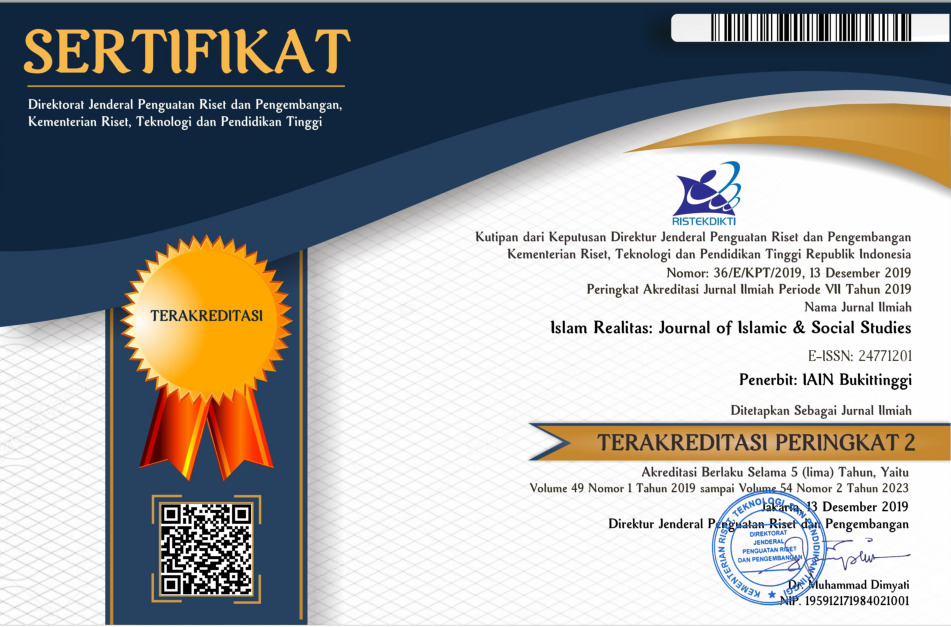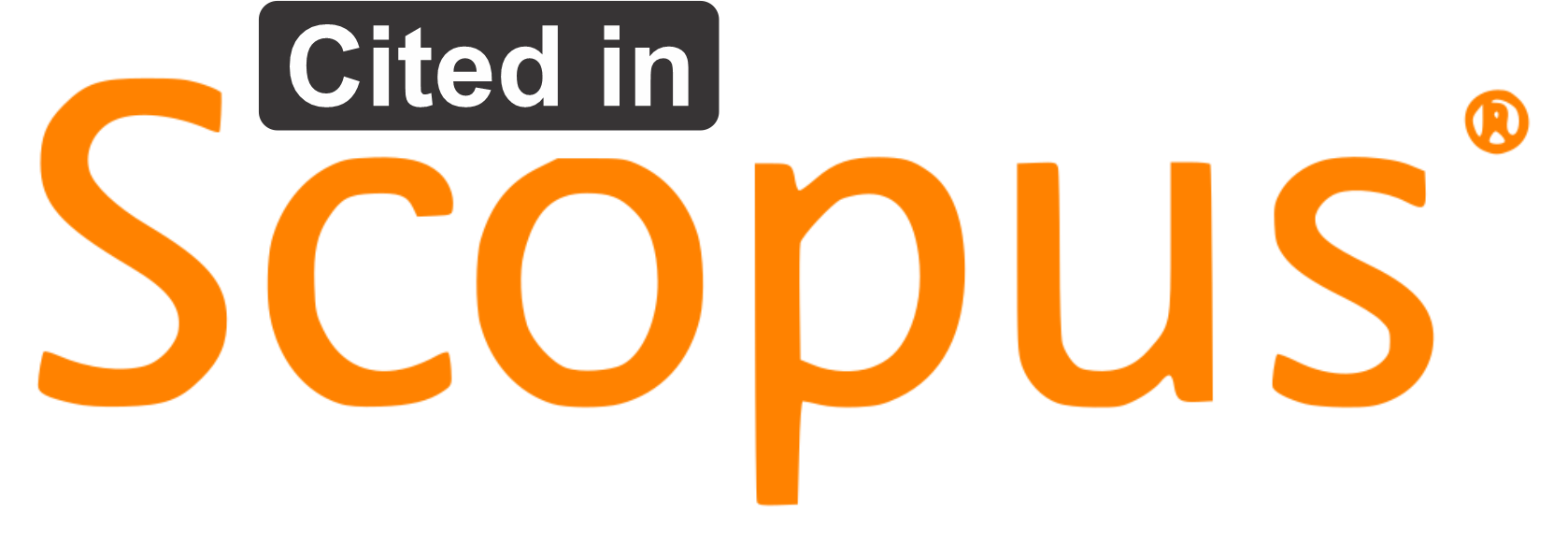DEVELOPING A MODEL OF COGNITIVE PSYCHOTHERAPY BASED ON INDONESIA ISLAMIC’ VALUES ON TERRORIST
Downloads
High rate of recidivism on terrorists indicates the weakness of deradicalization programs. This study aims to offer  a solution through development of a cognitive psychotherapy  which based on  Indonesia Islam values. The integration among Islam, culture and psychotherapy is able to help the terrorists to identify and restructure their cognitive that causes their emotion and destructive behaviors. This qualitivative study mixes between literature and phenomenology approaches. This study found that there are conflicting differences between the views of the terrorists and ijtihad of Indonesia Ulama regarding khilafah, jihad and takfiri concepts. In Addition, the model of cognitive psychotherapy based on Indonesian Islamic values was developed by content analysis and its implementation followed several systematic procedures such as anamnesis, assessment, diagnosis, intervention, result of intervention, follow up. Embracing humantic approach and collaborative Empiricism procesures enable the therapy effectively internalize Indonesia Islamic values such as Tasamuh (tolerance), Tawasuth (moderate), Tawazun (balanced), 'Adalah (Justice) and Ukhuwah (Brotherhood), which includes ukhuwah Islamiyah (other Muslims), Ukhuwah Wathoniyah (fellow citizens), Ukhuwah basyariah (fellow citizens) for the terrorists. These values could be intentionally internalized by terrorist itself and threfore it would be effective model  to modify terrorists’ destructive thought schemas (cognitive), emotion and behavior to be adaptive. Â
Â
Â
Â
Abstrak
Â
Residivisme pelaku terorisme yang tinggi menunjukkan kelemahan program deradikalisasi. Penelitian ini  bertujuan untuk menawarkan konstruksi model psikoterapi kognitif berbasis nilai Islam Indonesia sebagai salah satu solusi. Sebuah integrasi antara Islam, budaya dan psikoterapi dalam membantu pelaku terorisme mengidentifikasi dan merestrukturisasi kognitif yang menjadi penyebab emosi dan perilaku destruktif. Metode yang digunakan adalah penelitian kualitatif dengan menggunakan perpaduan studi literatur dan fenomenologi. Hasil penelitian menemukan adanya perbedaan pandangan yang kontradiktif antara pelaku terorisme dan ijtihad Ulama Nusantara mengenai konsep khilafah, Jihad dan Takfiri.  Selain itu model psikoterapi kognitif berbasis nilai Islam Indonesia dihasilkan melalui pengujian isi serta menerapkan beberapa prosedur atau tahapan yang sistematis yaitu anamnesis, pemeriksaan, diagnosis, kontruksi model terapi, hasil intervensi dan tindak lanjut. Melalui pendekatan humanis dan prosedur collaborative Empiricism terapi ini memungkinkan nilai-nilai Islam Indonesia yang mengedepankan Tasamuh (toleransi), Tawasuth (moderat), Tawazun (berimbang),‘ Adalah (Keadilan), dan Ukhuwah (Persaudaraan) yang meliputi ukhuwah Islamiyah (sesama Islam), Ukhuwah Wathoniyah (Sesama warga negara), Ukhuwah basyariah (sesama umat manusia) dapat terinternalisasi dengan kesadaran dan tanggung jawab dari pelaku teroris itu sendiri, serta dapat efektif mengubah skema berpikir,emosi dan perilaku teroris menjadi adaptif.
Â
REFERENCES
Text Book
Beck, Aaroon T., dan Marjorie E. Weishaar . Cognitive Therapy; dalam Raymond J. Corsini dan Danny Wedding, Current Psychoterapies, Fourth Edition.F.E. Peacock (Illinois : Peacock, 1989)
Beck, Judith .S (2005). Cognitive therapy :Basics and beyond. New York : Guilford Press.
Burns, David, Terapi kognitif. Pendekatan baru bagi penanganan depresi (Jakarta: Erlangga, 1988)
De la corte, L, La logica del terorismo.( Madrid : Alianza, 2006)
Direktorat Jenderal Pemasyarakatan (2008). Cetak Biru Pembaharuan Pelaksanaan Sistem Pemasyarakatan. (Jakarta : Departemen Hukum dan Hak Asasi Manusia Direktorat Jenderal Pemasyarakatan, 2006)
Ellis, Albert, Rational-Emotive Psychotherapyâ€; dalam D. Arbuckle (Ed.). Counseling and Psychotherapy. ( New York : McGraw-Hill, 1967)
Ellis, Albert, Rational-Emotive Theoryâ€, dalam A. Burton (Ed.), Operational Theories of Personality, (New York: Brunner/Mazel, 1974)
George, Rickey L and Therese Stridde. Cristiani.. Theory, Methods & Processes of Counseling and Psychotherapy (Englewood Cliffs, N.J.: Prentice-Hall, 1981),
Hurlock., Elizabeth. B.,Psikologi Perkembangan. Suatu pendekatan sepanjang rentang kehidupan, Edisi 5. (Jakarta : Erlangga, 1980)
Imam Al- Baijuri, Tahqiqul Maqam ala kifayatil Awam (Surabaya: Maktabah M Bin Ahmad Nabhan Wa Audaluh: tt)
Lezak, Muriel. Deutsch. (1995). Neuropsychological assessment. 3rd ed. New York : Oxford University Press
Nelson-Jones, R, Teori dan Praktik Konseling dan Terapi (Yogyakarta: Pustaka Pelajar, 2011).
Padesky, C.A. dan Greenberger, D, Clinician’s Guide to Mind Over Mood. (New York : Guilford, 1995)
Palmer, Stephen. & Dryden, Windy, Counseling for Stress Problems. (London: Sage Publication, 1995)
Sageman, Marc, Understanding terror networks. (Philadelphia: University of Pennsylvania Press, 2004).
Silber, Mitchell. D., & Bhatt, Arvin, Radicalisation in the West : The Homegrown Threat : (The New York City Police Department, 2007)
Wahid, Abdurrahman, Islamku Islam Anda Islam Kita. (Jakarta : The Wahid Institute, 2006)
Wahid, Abdurrahman, Musuh dalam Selimut. Ilusi Negara Islam. Ekspansi Gerakan Islam Transnasional di Indonesia. (Jakarta: The Wahid Institute, 2009)
Westbrook, David., Kennerley, Helen. & Kirk, Joan, An introduction to cognitive behaviour therapy : Skills & applications. (London : Sage Publication, 2007)
Journals
Berkowitz, Leonard. “ Frustration- aggression hypothesis : Examination and reformulationâ€, Psychological Bulletin, 106, 1989 h. 59
Berman, Sheri, “ Islamism, Revolution, and Civil Society, Perspectives on Politics, 1, American Political Science Association, 2003, h. 18
Bryant, Ernest.T., Monte .L. Scott, Charles .J.Golden, and Christopher .D. Tori. “Neuropsychological deficits, learning disability, and violent behaviorâ€, Journal of Consulting and Clinical Psychology 52:323, 1984, h. 4.
Covin, Roger., Dozois, David., Ogniewicz, Avital., & Seeds, Pamela. M. (2011). Measuring cognitive errors: Initial development of the Cognitive Distortions Scale (CDS). International Journal of Cognitive Therapy, 4, 297-322.
Milla Noor Milla. & Faturochman. Pembentukan identitas mujahid global pada terpidana kasus terorisme di Indonesia. Jurnal Psikologi Indonesia, Vol VI, No.2, 2009, 82
Vermande, M.M., Van den Bercken, J.H., & De Bruyn, E.E, “Effects of diagnostic classification systems on clinical hypothesis generation. Journal of Psychopathology and Behavioral Assessment, 18,1996, h. 49.
Victoroff, Jeff., “The mind of the terrorist: A review and crtitique of psychological approachesâ€, Journal of conflict Resolution, 49, 2005, h. 3.
Article in Media
Hassan., Nasra. An arsenal of believers : Talking to the “ human bombs.†The New Yorker 77:36, 2001
Sim, Susan. & Ismail Noor. Huda , “ Predicting terrorist recidivism in Indonesia’s prisons . The Brooking Press. 2016, january 28. Para.3 http://www.brookings.edu
Storr, Anthony.. The threat of man human agression. The Penguin Press, 1968, July 13 Diambil dari http://www. thetablet.co.uk
Interview
DF, Wawancara Pribadi, Selasa 29 Agustus 2017.
RS, Wawancara Pribadi, Selasa 29 Agustus 2017.
Authors who publish with this journal agree to the following terms:
- Authors retain copyright and grant the journal right of first publication with the work simultaneously licensed under a Creative Commons Attribution License that allows others to share the work with an acknowledgment of the work's authorship and initial publication in this journal.
- Authors are able to enter into separate, additional contractual arrangements for the non-exclusive distribution of the journal's published version of the work (e.g., post it to an institutional repository or publish it in a book), with an acknowledgment of its initial publication in this journal.
- Authors are permitted and encouraged to post their work online (e.g., in institutional repositories or on their website) prior to and during the submission process, as it can lead to productive exchanges, as well as earlier and greater citation of published work (See The Effect of Open Access).









